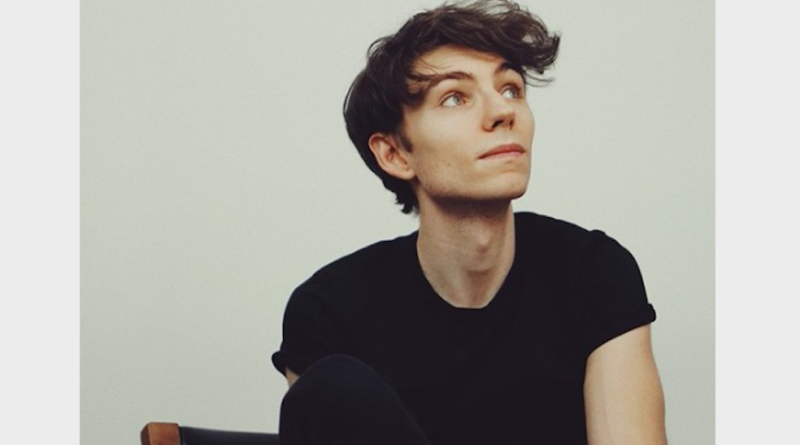INTERVIEW: Gabe Mouer still doesn’t know what he’s doing here
Photo: Gabe Mouer is the frontman of the band Patternist. Photo courtesy of the band / Provided by Earshot Media with permission.
Patternist, hailing from the Pacific Northwest, recently released their debut album, I Don’t Know What I’m Doing Here, featuring lead single “I Don’t Feel Real.” The recording comes courtesy of InVogue Records and features the vocals of the band’s frontman, Gabe Mouer.
The album’s cover is clever and an inside joke for those who know a bit about classic literature.
According to a press release, Patternist’s sound is defined as bursting with “a blend of rhythmic synths, heart-thumping percussion, and lush arrangements that backdrop songwriter Gabe Mouer’s boyish tenor and wistful lyrics. “
Recently Hollywood Soapbox exchanged emails with Mouer about the new recording. Questions and answers have been slightly edited for style.
What can listeners expect on your new album, I Don’t Know What I’m Doing Here?
It’s a record about feeling isolated and lost, residing in this paradoxical state of being my most personal work to date while not necessarily being autobiographical. I look at this album as a collection of short stories that share a common thread. From a production standpoint, it’s more guitar heavy than past releases. It’s more visceral. I wanted to convey a sense of desperation and immediacy.
What inspired the song ‘I Don’t Feel Real’?
The song came about during a drawn-out period [of] ennui following the release of the Give It Up EP. Building up to that release, I had started getting a little interest from labels and agents about the project, and, of course, it was exciting. And I let naiveté take me by the hand. You can’t help but get lost daydreaming about the possibilities when the gatekeepers tease you with entry, right? It’s entirely pernicious.
So I poured myself into making what I thought was my most professional and commercially viable work, but when it dropped the proverbial lines went dead. I thought, OK, maybe I just don’t have it. My entire sense of self is built around my creative endeavors, and when that stops feeling viable, I just feel useless. It’s ridiculously unhealthy but maybe kinda necessary and inescapable, but I wanted to communicate that emptiness in a way that felt more interesting than just three minutes of me being a sad bastard. So I committed to this narrative approach in an attempt to encapsulate some sort of shared experience. That set a precedent for the rest of the album moving forward.
How would you describe Patternist’s sound?
I joke that Patternist is ‘melodramatic guitar pop’ — over-simplifications of complex emotional states backdropped by reverb soaked, emo-inspired guitar riffs and built around a classic pop formula.
How did the band first come together?
I started Patternist with the goal in mind of doing as much as I could myself. Being in a band is hard. Organizing a bunch of musicians is like herding cats. I wanted to avoid that as much as possible. I did a small EP under a different moniker after leaving college and rebranded as Patternist in early 2015 with a series of singles including ‘Dizzy’ and ‘Gone.’
When I got the opportunity to start touring I realized I couldn’t take these arrangements and do them justice live solo, and that’s when Ashton stepped up and started taking up slack for everything I couldn’t do myself. She’s the only consistent touring member of the band, and it will probably stay that way. So Patternist is technically a solo project wherein I write and record everything, and Ashton does everything else. But I get all the credit, which I think is fair, haha.
Who were some of your musical influences growing up?
I think the first band I ever loved was The Cure. I have distinct memories of my mom putting on Galore and feeling like Robert Smith was just speaking to my little adolescent heart. When emo hit the mainstream in the early aughts, it felt like a revelation. With bands like Jimmy Eat World, Saves the Day, The Get Up Kids, there was this emotional rawness that I found captivating, while being just a bit smarter musically than most of their pop punk predecessors. I felt like it was something I had to be a part of. I’ve spent my career trying to recapture that feeling.
What inspired the band’s name?
The name is inspired by the psychological phenomenon of Apophenia, which essentially is the brain’s tendency for finding meaningful patterns or connections where they don’t exist. Pattern recognition is how the mind makes sense of the world, but it’s also incredibly fallible. So I fashioned the name Patternist as a way of saying, ‘We’re all a little flawed.’ But more than finding a moniker with some deep meaning, I just wanted a name no one else had already taken, haha.
What’s the future hold for the band beyond the album’s release in September?
You just hit on the million dollar question for my life. Being a career musician is such a tenuous and fragile pursuit. I just try to take it day by day because I have to prep myself for the possibility that my work isn’t what people want. I’m proud of this record. I think I have something to say that maybe sets me apart from other artists, but I can’t say for certain if that’s the case. The goal is to tour my ass off trying to get these songs in front of as many people as I can and just keep my fingers crossed it does well enough that I get to make another one.
By John Soltes / Publisher / John@HollywoodSoapbox.com
Patternist’s debut album is called I Don’t Know What I’m Doing Here. Click here for more information.

